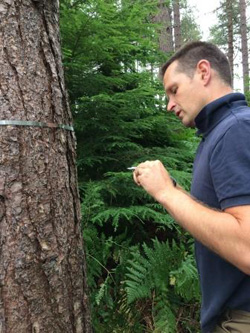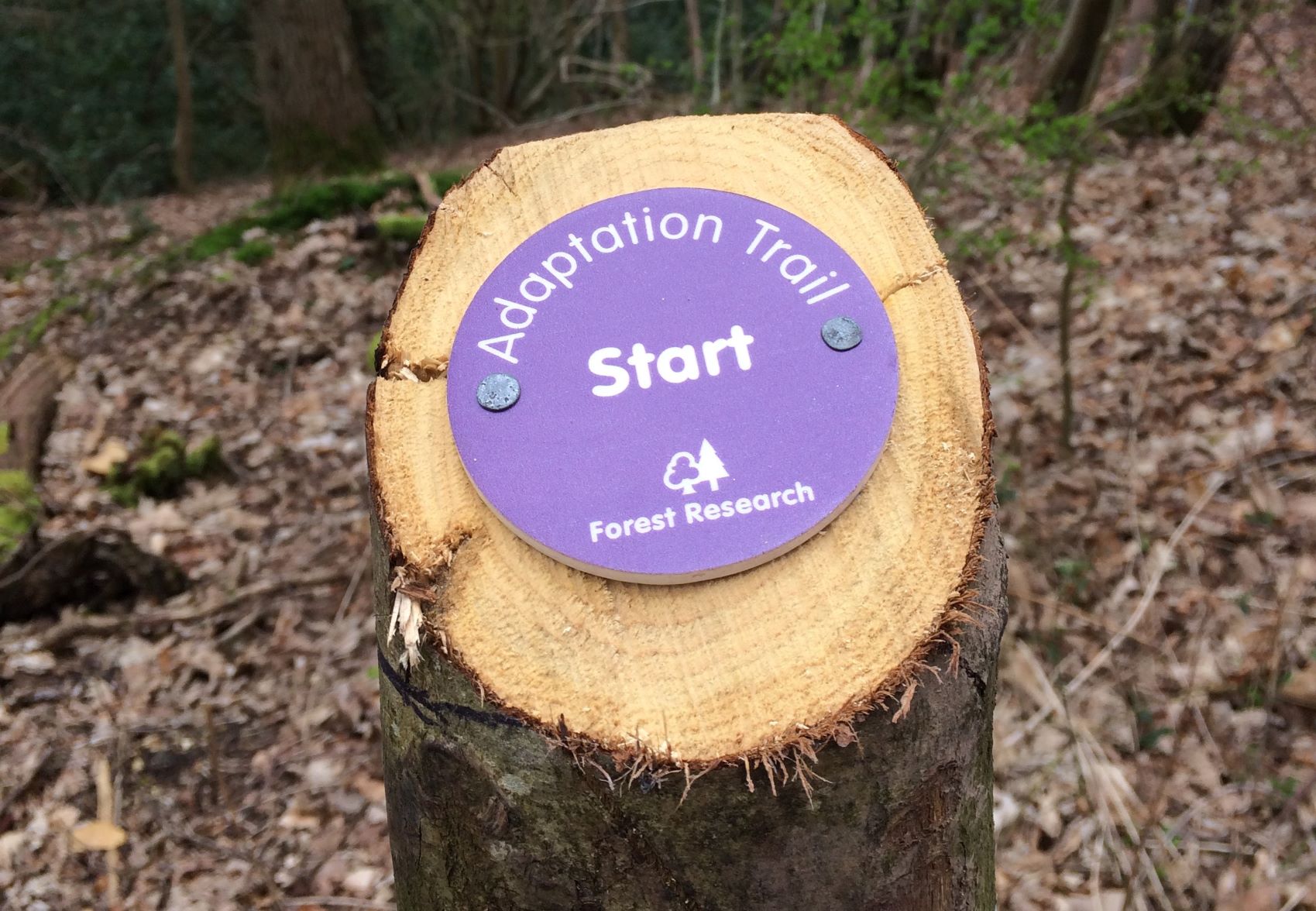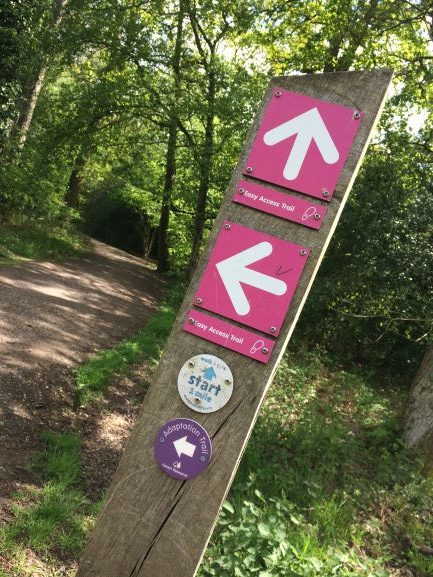Summary
Summary
This project is developing demonstrations of climate change adaptation measures in Alice Holt Forest. It aims to provide examples on the ground of where adaptive management and planning for future conditions can reduce the impact of the changing climate. We are doing this to understand how we can improve the resilience of forest stands to environmental change and create a platform for knowledge exchange on adaptive practice.
Research objectives
To co-develop, plan and implement aspects of adaptive practice into woodland management on the Public Forest Estate so as to:
- Develop demonstration activities and case studies to explain and share learning about adaptation actions in forestry;
- Inform future forest management decisions at Alice Holt Forest;
- Better understand the process and impact of implementing adaptive practice;
- Inspire adaptive management in the forestry sector.
Results so far
Through collaborative work between Forest Research and Forestry England South District we have been able to analyse adaptation measures and identify adaptation actions suitable for Alice Holt Forest and integrate them into the new Alice Holt Forest Design Plan.
 We have been able to select three areas suitable for climate change adaptation demonstration activity to inform key audiences.
We have been able to select three areas suitable for climate change adaptation demonstration activity to inform key audiences.
This has provided us with insights into the process of planning and delivering forest adaptation actions, in particular the selection of measures and the process of their integration into forest planning and the practicalities of adapting current woodland to future climates.
Baseline monitoring to assess key environmental parameters (including soils, ground vegetation, and tree growth) started in 2017, ahead of forest management operations to create the demonstration areas. Meteorological data are available from the nearby weather station at Alice Holt Lodge.
What is next?
We are working to better understand the impacts of climate change in the demonstration areas, and to share with and involve others in our learning.
Status
The project started in 2015 with phase one completed in 2019. Phase two started in 2021 and will run through to 2026 with ongoing monitoring of environmental variables.
Related products/services
Adaptation Trail Pages (Trail Guide / worksheet / audio guide)
Consultancy services related to Ecological Site Classification are available.
Related resources
Ecological Site Classification, a decision support tool to assess species suitability to deliver ecosystem services to the end of the century.
Contact
Funders and partners
Forestry Commission policy
The project supports a number of requirements for adaptation of forest and woodland to the changing climate, set out in the UK Forestry Standard (UKFS).
In particular, we demonstrate how to:
- Implement requirements to maintain or establish a diverse composition within the forest management unit and encourage a representative range of the native species associated with the woodland type.
- Consider the risks and opportunities of climate change and vulnerability to pests and diseases for particular species.
- Consider a wider range of tree species than has been typical of past planting, and the use of planting material from more southerly origins.
- Choose trees or shrubs which are well adapted to the site and which will promote future adaptation.
- Encourage natural regeneration of native tree and shrub species to promote natural selection and climate change adaptation.
Alice Holt Forest climate change adaptation trail
The Alice Holt Forest climate change adaptation trail opened in 2019.
The trail is designed to inform decisions about how we can adjust our woodland management practices to better prepare our woodlands for the changing climate. The trail shows a range of climate change adaptation measures and options.
The trail passes through three new demonstration areas which show climate change adaptation measures in a woodland typical of the south east of England. As well as the new demonstration areas, the trail includes 20th century research trials and the Alice Holt Arboretum, which are of fresh interest to those considering how to build resilience to environmental change.

The trail is located on the Surrey/Hampshire border. The forest contains a mix of broadleaf tree species and coniferous woodland which provides many important benefits. The future climate for the area is expected to include hotter, drier summers along with more frequent extreme weather events, such as droughts, which could lead to significant reductions in tree growth, biodiversity and ecosystem services such as carbon sequestration.
How can I visit the demonstration areas and the adaptation trail?
The trail starts in Alice Holt Arboretum car park which is located near to Forest Research’s Alice Holt Lodge and two miles from Alice Holt Forest Park. A self-guided trail guide and associated worksheet is available. Alternatively, if you would like a hard copy of the guide or to request it in audio format, contact us at adapt.ah@forestresearch.gov.uk
The trail is set within a working forest, please follow all safety signs and wear appropriate footwear. Please watch out for other visitors on foot, bike and horse and also any vehicles on the forest roads.
We hope this inspires you to find out more about the demonstration work, to come along to take a look at what is happening and let us know what you think. A range of case studies of adaptive practice from forests and woodlands across the UK (including Alice Holt Forest), plus a UK Forestry Standard Practice Guide on Adapting forest and woodland management to the changing climate are available to provide you with more information.
Findings and Recommendations
The planning, operations and implementation of the measures have already provided insights into the practicalities of adapting to future changes. The intention is that as they grow, they will continue to develop our learning about the process and impact of implementing adaptation actions in forestry, and encourage others to think about what measures might work best in their woodlands and to share their ideas and experiences.
Demonstrating climate change adaptation at Willows Green
Our climate is changing and in the future the climate of the south east of England will be more like that which is currently experienced in southern France. The effects of climate change are already being felt, for example in the south east of England, Oak now comes into leaf nearly a month earlier than it did in the 1950’s.
At Willows Green, Forest Research and Forestry England are doing work to understand how these changes are impacting the woodland and what we can do to better prepare the woodland to cope.
A demonstration area has been set up to show forest management actions that may be taken to try to help a woodland typical of is part of England, adjust to our changing climate.

The demonstration area at Willows Green is part of a Climate Change Adaptation Trail which starts a few minutes’ drive from the Alice Holt Forest Visitor Centre in Alice Holt Arboretum Car Park. It is one of several demonstration areas which are being used to learn more about the process and impact of implementing climate change adaptation actions in forestry, and in turn to encourage land managers to think about what measures might work best in their woodlands.
What forest management actions are being demonstrated?
At Willows Green, one of the main changes are hotter drier summers. Beech trees can suffer in these conditions, especially if there are repeated episodes of drought.
First, some of the beech trees were removed a few years ago in a process called ‘thinning’. In 2018 new trees were planted to replace them. This ‘underplanting’ is of oak trees which have been grown from native English seed sources and from seed sources from further south in Europe (France) which have a climate like the one which Alice Holt is likely to have in the future.
Scientists at Forest Research are monitoring the young oak trees to find out more about how the trees from different seed sources cope with the changes in our climate. There may be positive impacts such as improved growth and survival or negative impacts like more damage from a late spring frost or pest outbreak. We will also be looking at how the growth of the newly planted trees compares to the growth of naturally regenerating beech trees beneath the mature beech woodland (trees that develop from beech seeds that fall and germinate on the site).
How can I visit the demonstration area (Stop 8)?
The adaptation trail starts in Alice Holt Arboretum but Stop 8 starts in the forest park. Park in the first car park on the right, after the car park barriers. Small purple discs mark the ‘Adaptation Trail’ to Stop 8. Walk up Orchard Ride on the Easy Access Discovery Trail to the picnic bench (see photo) and turn left, downhill.
When you reach the crossroads with the large Gruffalo and Stick Man sculptures on your left, turn right into the beech woodland. Stop 8 is along this path, on the bend. As you look down the hill, the English Oak is planted in the tubes in the clearing to your left, the French Oak is slightly further down the hill to your right.
To visit the other stops on the ‘Climate Change Adaptation Trail’, a self-guided trail guide and associated worksheet are available to download using the links above on this page.
The trail is set within a working forest, please follow all safety signs and wear appropriate footwear. Please watch out for other visitors on foot, bike and horse and also any vehicles on the forest roads.
We hope this inspires you to find out more about the demonstration work, to come along to look at what is happening. Let us know what you think or ideas to get involved by emailing us at adapt.ah@forestresearch.gov.uk.
